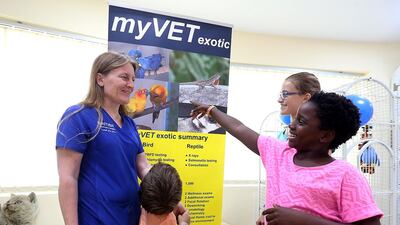DUBAI // Owners of exotic pets are learning about the risks that come with keeping the snakes, lizards, birds and sharks that are cared for by vets from the British Veterinary Hospital.
An open day at the Al Warsan facility attracted owners and would-be owners of all kinds of pets, seeking advice on how to keep them safe and how not to risk fuelling the illicit trade in rare species.
It is illegal to own many rare species in the UAE but an online trade in exotic pets is booming because of busy social media channels.
Many first-time owners were unaware of the risks exotic pets may pose to their families.
“People buy on impulse from pet shops legally but often have no clue how to care for these exotic animals correctly,” said Dr Sarah Elliot, director and owner of the British Veterinary Hospital.
“They then wonder why their pet becomes ill and dies.
“One woman we’ve seen owned a beautiful parrot but was force-feeding it insects when, in fact, it was vegetarian, so it died.”
The wrong care is often lethal, and some owners are repeat offenders, believing the normal life cycle of a parrot is two to three years when, in fact, they should live for 35 to 40 years if cared for properly.
Specialists at the open day offered advice on what suitable habitats are required for some animals, the most appropriate diet, level of upkeep required to maintain a healthy animal and the costs involved.
Animal experts said they were amazed at how many owners of exotic pets were woefully ill-informed about what it takes to care for them.
It is thought about 70 per cent of reptiles will have traces of salmonella on their skin that can be passed on to humans. Some birds can also carry pneumonia that can be fatal to young people or the elderly, particularly if there is an existing respiratory problem.
“I’ve treated pet sharks in Dubai, and some of the bigger cats,” Dr Elliot added.
“If someone does bring in a baby cheetah to us, we will always try and persuade the owner to give it up to a breeding facility rather than keep it as a pet, so the species can be protected.”
nwebster@thenational.ae


